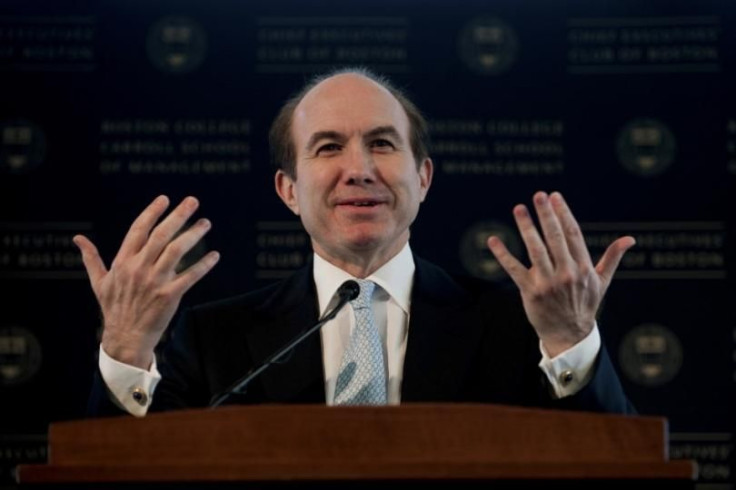Can Viacom (VIAB) CEO Philippe Dauman Be Fired? Sumner Redstone's Latest Moves Could Mean Dauman’s Days Are Numbered

The future of Viacom Inc., which once dominated youth-oriented TV, may well be decided in court. On Friday, Sumner Redstone, the 92-year-old chairman emeritus of both Viacom Inc. and CBS Corp., suddenly removed Viacom CEO Philippe Dauman from the seven-person trust of Redstone's National Amusements Inc., which controls both companies.
On Monday, Dauman filed a lawsuit arguing that Redstone is, essentially, no longer mentally competent to make decisions regarding the trust, which will control CBS and Viacom after Redstone dies or is deemed mentally incompetent, and that his actions should be blocked.
An attorney for Redstone promptly fired back, asking a judge to affirm Redstone's right to remove Dauman from the trust. Doing so places 80 percent of the voting shares of CBS and Viacom into the hands of his once-estranged daughter, Shari Redstone, 62. Dauman must convince a judge of Redstone's incompetence, mere months after testifying in another case that the aged billionaire was "engaged, attentive, and as opinionated as ever."
At stake is the future of two stalwarts of old media: CBS and Viacom. But also, more specifically, at stake is the future of Dauman, Redstone's longtime confidant, who is under increasing pressure to turn around the ailing Viacom, parent of youth-skewing networks like MTV and Nickelodeon.
Redstone owns 80 percent of the voting shares of both Viacom and CBS through his holding company National Amusements. By removing Dauman and another ally, George Abrams, Redstone essentially shifts control of both huge companies to his daughter Shari, who will then decide their fate after he has left the scene.
The move therefore strips Dauman of one particularly important layer of job security. While Dauman remains CEO of Viacom itself, Redstone and the trust could take that away as well. “Sumner could move very quickly if he wanted to,” says Eric Jackson, managing director for New York hedge fund SpringOwl Asset Management. “He could do that this week, really.”
Mario Gabelli, Viacom’s second-largest shareholder, told CNBC Monday morning that he thinks Dauman has six months to “turn things around.”
In their suit filed Monday, Dauman and Abrams argued that Redstone is being manipulated by his daughter.
“This is a case in which an ailing 92-year-old man’s multibillion-dollar businesses have been seized by an estranged daughter who has manipulated her father to achieve her goals,” Dauman and Abrams’ suit reads. “The father is in the grip of a neurological disorder and other serious ailments and is dependent on his daughter for care and sustenance. A lawyer with whom Mr. Redstone has never before been associated has served notice that the father has suddenly embraced his daughter’s long-denied wishes for control of his businesses.”
Shari Redstone and Dauman have frequently been at odds over the years — she voted against his appointment as chairman in February, saying the board needed an independent leader not involved in the National Amusements trust.
That problem would now appear to have been solved, but the removal of Dauman from the trust is still being viewed by investors as the first step in a longer journey toward the front door for the CEO.

Depending on how you look at it, the timing of Dauman’s removal is either suspicious or fortuitous. Dauman and Abrams’ dismissal from the National Amusements trust came less than two weeks after the dismissal of a case in which Manuela Herzer, the girlfriend who had formerly been designated as Redstone’s healthcare agent, claimed he had been mentally incompetent when he removed her as the person responsible for his medical decisions. Dauman held in that suit that Redstone was “engaged, attentive, and as opinionated as ever” as of November.
According to Dauman and Abrams’ filing, that statement no longer holds true: “Indeed, during the first week of March, Mr. Dauman visited Mr. Redstone, and Mr. Redstone appeared almost totally non-responsive, and could not meaningfully communicate at all.”
The first week of March was, perhaps coincidentally, right after the Feb. 29 dismissal of the Herzer case. It should be noted, though, that the judge in that case did not specifically rule on Redstone’s mental competency when dismissing the action.
Dauman, Viacom and the Redstones have been trading increasingly detailed and ornery public statements through spokesmen. Viacom said its board has attempted to meet with Sumner Redstone in person but been blocked from doing so by Shari. Shari Redstone said her father is still capable of making his own decisions. Sumner Redstone, according to a statement, said he “regrets that Mr. Dauman has diverted resources to these baseless attacks and misrepresentations, rather than focusing on the continuing challenges that are faced by Viacom.”
Redstone’s main bone of contention appears to be Dauman’s desire to sell a minority stake in Paramount Pictures, which Dauman says Redstone had approved in February. Redstone insists he doesn’t want to sell any part of Paramount, which was just about the only proposed action by Dauman that seemed to perk up pessimistic investors.
Investors now have to weigh the possible departure of Dauman with the downside of Paramount remaining in the Viacom fold. “I think more people will be happy about Philippe potentially leaving,” Jackson says. “That would far outweigh the negatives of a potential non-Paramount sale.”
As for what might happen to Viacom in a post-Dauman era, Jackson says he’s hoping for a more creative-minded person to take the helm, offering up AMC Networks CEO Josh Sapan as a possibility, with AMC and Viacom merging. A Viacom-AMC merger, he adds, would give Viacom a much-needed creative shot in the arm and AMC some extra leverage in negotiating carriage deals with cable operators.
Viacom stock has slid 40 percent in just the last year, thanks to investor concerns over declining ratings at its cable networks and what they consider a lack of progressive thinking.
As of publication time, Viacom stock was up 3.4 percent Monday.
© Copyright IBTimes 2024. All rights reserved.






















